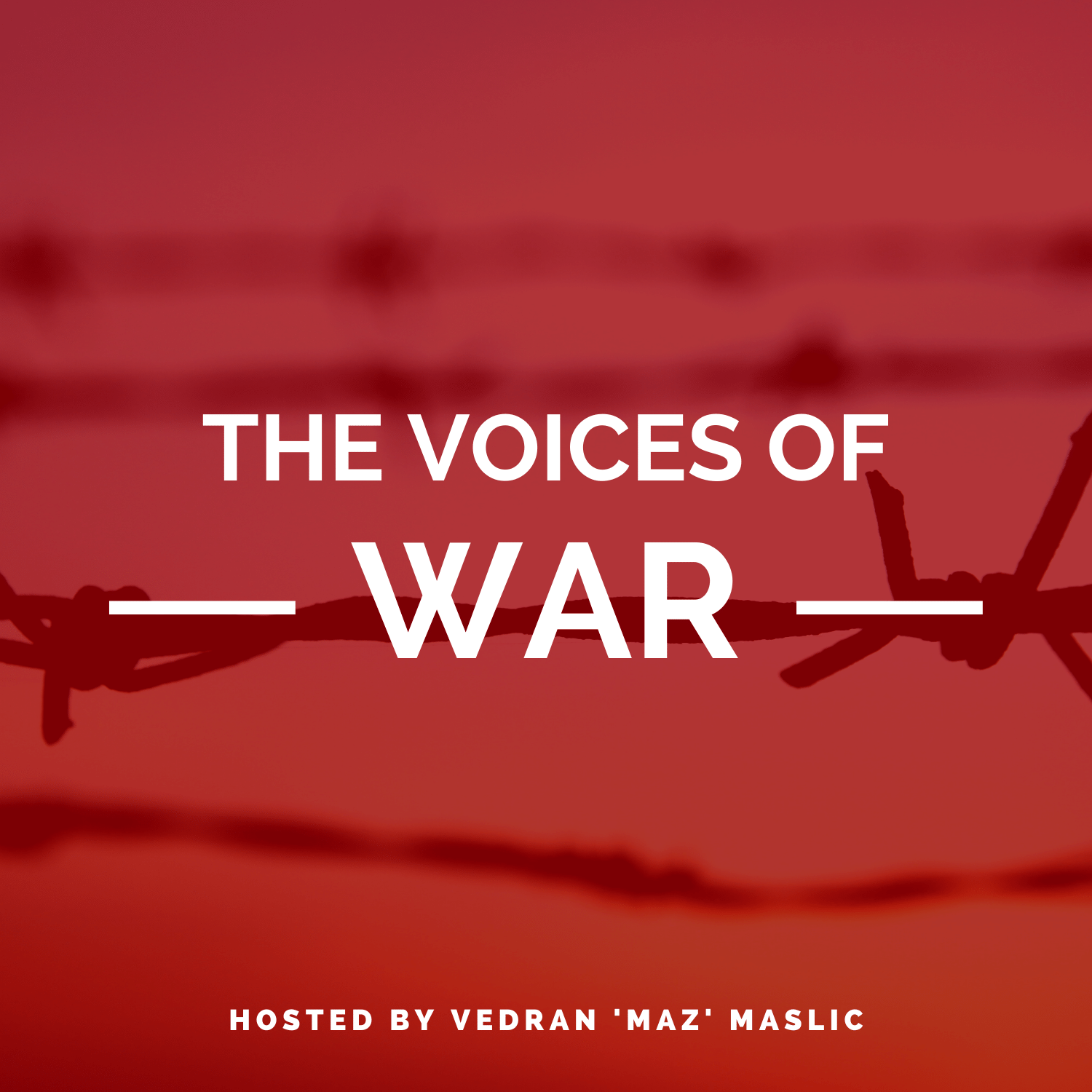
‘The Voices Of War’ is guided by a simple vision—to scratch below the simple narratives of war through the voices of those who understand its complexities.
To do this, I speak with refugees, soldiers, negotiators, academics, development workers, and anyone else whose life has been shaped by war, be they a survivor, a perpetrator, a mediator, a student, or a healer of it.
Ultimately, I want to make it lucid that neither war nor peace is a forgone conclusion. Both are a product of upstream causes that make one or the other more likely. Understanding and embracing this fact is critical when trying to find moral and ethical solutions to our many local, regional, and global challenges.
Episodes
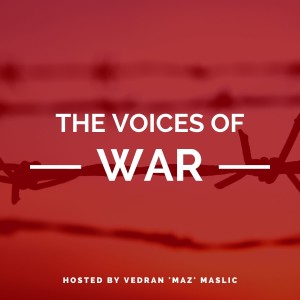
Thursday Feb 27, 2025
111. Lest We Forget: Our Duty Is Not To The People with David McBride
Thursday Feb 27, 2025
Thursday Feb 27, 2025
David McBride, a retired Major and former legal officer in the Australian Army, discusses his actions of leaking information to the Australian Broadcasting Corporation (ABC) that ultimately led to the exposure of alleged war crimes committed by Australian soldiers in Afghanistan. David highlights the political manipulation of the war narrative and emphasises the need for clear rules of engagement. David became disillusioned with the Australian military's handling of war crimes and the seeming politicisation of the war in Afghanistan. He observed a lack of proper investigations into war crimes and a focus on appearances rather than effectiveness. McBride suspected that the Australian government was trying to cover up war crimes to maintain their alliance with the US. David decided to take action and expose the political games played by leaking classified documents to the media. David McBride discusses his career and the challenges he faced when he discovered evidence of mishandling of allegations by Defence and political seniors. He highlights the lack of accountability and poor leadership within the military, and the difficulty he faced in trying to bring attention to these issues. McBride emphasises the need for a fair trial and public support to address the systemic problems within the military. He also shares his thoughts on ANZAC Day and the importance of genuine care for veterans.Key Takeaways
David McBride, a former legal officer in the Australian Army, leaked information about alleged war crimes committed by Australian soldiers in Afghanistan.
He highlights the excessive investigation of special forces soldiers and the political manipulation of the war narrative.
McBride emphasises the need for clear rules of engagement and the importance of holding soldiers accountable for their actions.
He also discusses how the Australian military mishandled war crimes and prioritised appearances over justice.
The government may have tried to cover up war crimes to maintain their alliance with the US.
David McBride took action by leaking classified documents to expose political games. The military leadership needs to be held accountable for potential war crimes and poor leadership.
There is a need for a fair trial and public support to address systemic problems within the military.
ANZAC Day should be a day of genuine care for veterans, not just political window dressing.
Chapters03:00 Uncovering Alleged War Crimes
12:01 The Power of Narratives
35:46 The Australian Military's Mishandling of War Crimes
01:02:06 David McBride's Whistleblowing and Exposing the Truth
01:12:22 The Problem Starts at the Top
01:21:09 The Need for Accountability and Leadership
01:32:11 The Legal Dilemma

Thursday Feb 27, 2025
110. 🎙 AI's Impact on Massive Death Toll in Gaza with Meron Rapoport
Thursday Feb 27, 2025
Thursday Feb 27, 2025
Summary
The conversation with Meron Rapoport, an Israeli journalist, focuses on the use of AI in Israel's bombing campaign in Gaza. The investigation reveals that an AI machine, called Lavender, was used to create a list of targets, resulting in a high death toll and destruction. The conversation covers the level of involvement in the investigation, the role of military censorship in Israel, the surprise at the article passing censorship, and the lack of awareness about this process globally. The main themes include the technological side of AI in warfare, the use of private homes as targets, the collateral damage caused, and the allocation of munitions based on target importance. The conversation explores the principal themes of the Israeli-Palestinian conflict, focusing on the trauma experienced by Jewish Israelis, the goals of the Israeli military campaign, the impact on the Gaza population, the lack of reporting in Israel, and the long-term consequences for Israeli society. The conversation also touches on the use of AI technology in warfare and the potential dangers it poses. The main takeaways include the need for a political solution, the fear and insecurity felt by Jewish Israelis, and the importance of understanding the human cost of the conflict.
Keywords
AI, Israel, Gaza, bombing campaign, investigation, military censorship, surprise, technological side, private homes, collateral damage, munitions, Israeli-Palestinian conflict, trauma, military campaign, Gaza, reporting, AI technology, political solution, fear, insecurity, human cost
Takeaways
AI was used in Israel's bombing campaign in Gaza, resulting in a high death toll and destruction.
The military censorship in Israel requires approval for any information related to the army, leading to self-censorship and limited dialogue.
The use of private homes as targets and the high collateral damage raises ethical concerns.
The allocation of munitions based on target importance shows a pragmatic and systematic approach to warfare. The trauma experienced by Jewish Israelis is a significant aspect of the Israeli-Palestinian conflict.
The goals of the Israeli military campaign include destroying Hamas and making life in Gaza impossible.
There is limited reporting on the conflict in Israel, leading to a lack of awareness of the human and infrastructure costs in Gaza.
The use of AI technology in warfare raises ethical concerns and can lead to large-scale destruction.
A political solution is necessary to address the root causes of the conflict and ensure long-term peace.
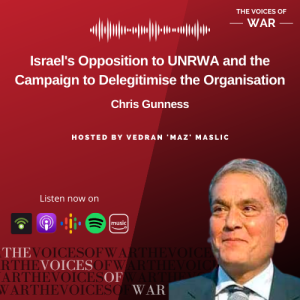
Thursday Feb 27, 2025
Thursday Feb 27, 2025
Chris Gunness discusses the role and mandate of UNRWA, the United Nations Relief and Works Agency for Palestine Refugees, and the challenges it faces amidst the ongoing conflict in Gaza. He highlights the size and scope of UNRWA's operations, providing education, healthcare, and social services to millions of Palestinian refugees across the Middle East. Chris also addresses the historical context of the Palestinian refugee crisis and the failure to find a durable solution. He explores the motivations behind Israel's opposition to UNRWA and its campaign to delegitimise the organisation. The conversation delves into the impact of the information war and the desensitisation of the Israeli population to the suffering of Palestinians. The conversation then delves into the impact of the smear campaign against UNRWA, the role of media in shaping narratives, and the asymmetry in the information war. We discuss the systematic efforts to dismantle UNRWA and the consequences of its defunding. The conversation also explores the enduring impact of the recent events in Gaza on geopolitics and the potential for a just and durable solution to the Israeli-Palestinian conflict.KeywordsUNRWA, Palestine, refugees, Gaza, genocide, humanitarian, Israel, mandate, education, healthcare, social services, history, right of return, durable solution, occupation, genocide, asymmetry, information war, desensitisation, UNRWA, smear campaign, media, information war, defunding, humanitarian organisations, Gaza, geopolitics, Israeli-Palestinian conflictKey Takeaways• UNRWA is a massive organisation that provides education, healthcare, and social services to millions of Palestinian refugees across the Middle East.• The Palestinian refugee crisis is a result of the 1948 Middle East War and the failure to find a durable solution, including the right of return for refugees.• Israel opposes UNRWA and seeks to delegitimise the organisation due to its fear of a demographic shift and the potential loss of a Jewish majority.• The information war and asymmetry in power contribute to the desensitisation of the Israeli population to the suffering of Palestinians.• The international community must read and understand the history and context of the conflict to challenge false narratives and work towards a just and lasting solution. The smear campaign against UNRWA and the defunding of humanitarian organisations have had a significant impact on their operations and reputation.• The asymmetry in the information war, with right-wing Zionists dominating the narrative, has hindered the dissemination of accurate information.• The recent events in Gaza have further damaged the prospects for a just and durable solution to the Israeli-Palestinian conflict.• The enduring impact of the events in Gaza includes a loss of faith in international law and a potential increase in regional instability.• There is a need for independent investigations and accountability for the crimes committed during the recent conflict.

Thursday Feb 27, 2025
108. Return of The Voices Of War
Thursday Feb 27, 2025
Thursday Feb 27, 2025
In this monologue, I reflect on my absence before expressing frustration with the limited and oversimplified coverage of war and conflict, especially Israel's war on Gaza. I unequivocally criticise Israel's actions, highlighting the need to look beyond headlines and focus on immediate reduction of human suffering. I also announce upcoming interviews with experts to shed light on geopolitical machinations and analyse global conflicts, including Chris Gunness, Francesca Albanese, and David Petraeus.

Thursday Feb 27, 2025
107. 2023 Wrap-Up: A Year of Insight and Inquiry
Thursday Feb 27, 2025
Thursday Feb 27, 2025
As 2023 draws to a close, I want to take a moment in this special year-end episode to reflect on the enlightening journey we've embarked on together through 'The Voices Of War.' This year, we’ve traversed a wide array of topics, spanning more than 35 hours of interviews across 26 episodes, reaching over 100,000 downloads, and connecting with listeners in more than 150 countries.
Our conversations have taken us deep into the heart of current global conflicts, including the ongoing Russian invasion of Ukraine and the Israel-Hamas war, where we've attempted to unravel the complex layers of these protracted struggles. We've dived into the dark waters of radicalisation, seeking to understand the roots and paths that lead individuals down this route. We explored the rapidly evolving field of artificial intelligence and its ethical implications in both civilian life and warfare, highlighting how technology is reshaping the character of war, if not its nature. We've grappled with the ethics of war, questioning the moral dilemmas faced by those on the front lines and the decision-makers behind them. We delved into war’s impact on mental health, and the unseen scars it leaves on individuals and societies, offering a sombre yet necessary reflection on the unspoken costs of conflict. We’ve looked at dehumanisation, the impact of information on our behaviour and we explored how our desire for status makes us vulnerable to exploitation. All these topics sought to contribute to the same goal—to scratch below the simple narratives of war, that dominate our mainstream and social media channels.
Lastly, as I prepare for my transition from the Army to civilian life (a surprise to some but not to others), these conversations have certainly enriched my perspective on the world we live in. I hope they have done the same for you. Thank you for joining me on this journey and here's to continuing our quest for nuance and depth in 2024.
#TheVoicesOfWar #2023WrapUp #Podcast #Reflections #GlobalConversations #WarAndPeace
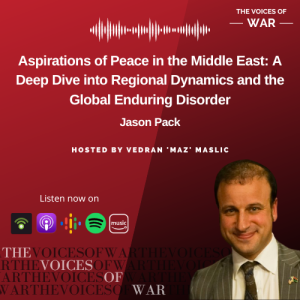
Thursday Feb 27, 2025
Thursday Feb 27, 2025
Today, I spoke with Jason Pack, author of the acclaimed book ‘Libya and the Global Enduring Disorder’, and a recognised expert on the Middle East. Jason also hosts the excellent Disorder podcast and serves as a senior analyst for emerging challenges at the NATO college in Rome. With over two decades of research in the Middle East, Jason brings a unique perspective to understanding the complexities of the region’s geopolitics.
This is Jason’s second appearance on the show. We first spoke back in May of 22, in Episode 55. That time, we explored Jason’s excellent book and his concept of the Global Enduring Disorder. You can listen to that episode here. Today, Jason joins me to discuss the recent escalation of violence in the Middle East, how it relates to the idea of the Global Enduring Disorder and what we might need to consider when looking for an enduring and just peace in the region.
00:00 Introduction to Jason Pack
Jason discusses his background and the relevance of his work in current global affairs.
Jason shares his transition from studying to focusing on Middle East geopolitics post-9/11, including his experiences in Beirut, Egypt, Syria, and Libya.
06:20 The Concept of Global Enduring Disorder and Orderers vs Disorderers
Jason explains his concept of 'Global Enduring Disorder', contrasting the current global landscape with the past, focusing on the shift from order to disorder.
Jason proposes a perspective to view global politics as a struggle between forces of order and disorder, expanding beyond traditional ideological divides.
13:15 The Impact of American Foreign Policy in the Middle East
An Analysis of the influence and consequences of American hegemony in the Middle East, particularly regarding the Israel-Palestine conflict.
15:15 Interconnected Global Conflicts
Jason discusses how various global conflicts, including the Israel-Palestine issue, are interconnected and influence each other.
Exploring the involvement of Russia and Iran in fostering global disorder, including their potential roles in the Israel-Palestine conflict.
23:05 The Three Blocks of Middle East Geopolitics
Jason categorises the Middle Eastern geopolitical landscape into three distinct groups, focusing on their respective roles and alliances.
25:56 The Pivotal Role of Qatar in Middle Eastern Peace
Jason discusses Qatar's unique position in the Middle East and its potential role in bringing peace and stability to the region.
33:15 The Middle East Peace Process: A New Approach
Exploring a novel approach to the Middle East peace process, involving regional players and addressing underlying causes.
39:10 Addressing Root Causes of the Israel-Palestine Conflict
Discussion about the necessity of addressing the underlying causes of the Israel-Palestine conflict, including the creation of a Palestinian state and the role of external influences.
42:15 The Complexity of the Israel-Gaza Conflict in Global Perception
Jason delves into the reasons behind the global attention on the Israel-Gaza conflict, highlighting the unique position of Jews and Israel in global dynamics and the disproportionate global response to the conflict.
52:38 The Potential of Qatar in Resolving Middle East Conflicts
Jason reiterates the strategic importance of Qatar in bringing peace to the region, emphasising its unique position as a mediator among various conflicting parties.
55:09 The Influence of Gulf States in Global and Regional Politics
Jason discusses the growing influence of Gulf states like the UAE and Qatar in global and regional politics, highlighting their roles in funding, cultural influence, and diplomacy.
01:02:14 Closing Thoughts: Challenges and Hope for Middle East Peace
Jason concludes with his thoughts on the ongoing challenges in achieving peace in the Middle East and the potential for a new approach involving Gulf states to bring stability to the region.
Resources:
The Road to Middle East Peace Runs Through Doha, Foreign Policy: https://foreignpolicy.com/2023/11/07/qatar-israel-hamas-gaza-war-middle-east-peace/
Episode 55. Jason Pack - On the ’Global Enduring Disorder: https://thevoicesofwar.com/55-jason-pack-on-the-global-enduring-disorder/
Jon Wiener Podcast on plan to end war in Gaza: https://www.thenation.com/podcast/world/sms-guttenplan-powers-113023/
Finally, don't forget to review, rate, and share The Voices of War to help us continue exploring the complex narratives of war. To comment or take the conversation further, please connect with us here:
https://www.thevoicesofwar.com
https://www.twitter.com/twitter.com/thevoicesofwar
https://au.linkedin.com/company/the-voices-of-war
https://www.youtube.com/youtube.com/thevoicesofwar
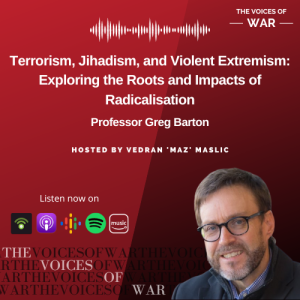
Thursday Feb 27, 2025
Thursday Feb 27, 2025
Today, I spoke with Professor Greg Barton, a prominent Australian academic with a distinguished career specialising in global Islamic politics and countering violent extremism. His expertise, particularly in the realm of Islamic thought, positions him as a leading authority on issues of terrorism, extremism, and the development of effective interventions. Author of several influential articles and books, Professor Barton offering deep insights into the convergence of religion, politics, and societal challenges.
This is Greg’s second appearance on the show. Last time he joined me was on Episode 81, where we discussed the process of radicalisation generally. On that occasion, we used the Russian invasion of Ukraine, the Covid pandemic as well as far fight extremism as the vehicle for our discussion. Today, Greg joins me for a follow-up with a particular focus on the events unfolding in the Middle East and their impact globally.
Main topics we covered include:
0:00 Introduction to Professor Greg Barton: A brief introduction to the episode and Professor Barton's background in global Islamic politics and countering violent extremism.
5:52 Deliberate Provocation by Hamas: Analysis of Hamas' tactics in Gaza and their global impact, including use by extremist groups for support generation.
8:10 Waning global support for Israel: An assessment of how global support for Israel might be shifting in the face of their response to the October 7th attack.
16:43 International Humanitarian Law: A reflection on Israeli application of the laws of war on their military operations in Gaza
23:42 Jihadism vs. Islamism: Clarifying the Concepts: A discussion aimed at differentiating between Jihadism and Islamism, with a focus on Hamas.
39:06 Decoding the Radicalisation Process: Exploring the 'triple P model' of radicalisation and how individuals are drawn to extremist ideologies.
44:08 Battle for Hearts and Minds: An analysis of the likely impacts of current military actions in Gaza on future cycles of violence.
53:34 Radicalisation at scale: A reflection on the ongoing global polarisation via mainstream and social media
57:25 Human Nature and Extremism: Emphasising the inherent potential for good in human beings and how this can be leveraged to counteract extremist ideologies.
1:08:20 Greg’s biggest concern: A reflection on how the current situation can descend into an even greater calamity.
Professor Barton's insights offer a comprehensive understanding of the intricate dynamics of global Islamic politics, terrorism, and the ongoing challenges in countering violent extremism. His unique perspective combines academic rigour with a deep understanding of the human elements at play in these critical global issues. I hope you get as much out of this conversation as I have.
Resources:
• You can listen to Greg’s previous episode here.
• You can view my short reflection on the current situation here.
Finally, don't forget to review, rate, and share The Voices of War to help us continue exploring the complex narratives of war. To comment or take the conversation further, please connect with us here:
https://www.thevoicesofwar.com
https://www.twitter.com/twitter.com/thevoicesofwar
https://au.linkedin.com/company/the-voices-of-war
https://www.youtube.com/youtube.com/thevoicesofwar
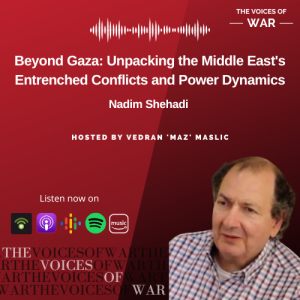
Thursday Feb 27, 2025
Thursday Feb 27, 2025
Today, I spoke with Nadim Shehadi, a distinguished Lebanese economist and academic, who delved into the intricate mesh of Palestinian, Israeli, and broader Middle Eastern politics, economics, and conflicts. With a rich background that spans prestigious positions at the Fletcher School, Chatham House, and Oxford as well as personal experiences of previous wars in Lebanon and beyond, Nadim brings a nuanced perspective to the complexities and tragedies of the region.
Some of the key topics we covered are:
· Gaza Dynamics: Analysing recent events in Gaza, Nadim offers an expert take on the guerrilla warfare tactics of Hamas and the cyclical nature of the conflict with Israel.
· Global Reactions: The discussion turns to the diverse international reactions to the Gaza conflict, highlighting the polarising effect on global politics.
· Trap Warfare: Nadim introduces the concept of 'trap' warfare, elucidating how Hamas's tactics bait international disapproval for Israel.
· Lebanese Sovereignty: The conversation addresses Hezbollah's role in Lebanon, discussing the challenges to Lebanese sovereignty and governance.
· Civilians in Conflict: An exploration of the civilian experience in Gaza and Lebanon, emphasizing the human cost of ongoing tensions.
· Resistance and Negotiation: Nadim contrasts the methodologies of armed resistance and negotiation in political struggle.
· Lebanon's Political Mosaic: A historical overview of Lebanon's political evolution, with insights into its unique culture and the legacy of empires.
· Intricacies of Conflict: Nadim delves into the intricate connections between local politics and broader regional dynamics, underscoring the international community's involvement.
· Regional Dynamics: The discussion highlights the strategic roles of Arab states, the Gulf region, Egypt, Jordan, the European Union, and the United States in fostering stability.
· Critique of U.S. Policy: Nadim offers a critical analysis of the U.S. foreign policy in the Middle East, noting a misalignment with the complex regional context.
· Security Concerns for Israel: Insights into Israel's security priorities and the existential challenges it faces from regional adversaries.
· Underestimating Iran: A critique of the U.S. administration's oversight of Iran's influence in the region, particularly in relation to the JCPOA.
· Policy Proposals Examined: Nadim assesses Antony Blinken's policy proposals, suggesting they lack the depth required to grasp the region's nuanced challenges.
· Survival Mentality: The conversation closes with a personal reflection on living under constant threat, depicting the day-to-day reality of Middle Eastern geopolitics.
Nadim Shehadi's expertise sheds light on the historical and current challenges facing the Middle East, offering a profound examination of the power dynamics at play. This episode is a must-listen for anyone seeking to understand the deeper narratives that shape this complex region.
Resources:
Lebanon is revisiting the ghost of the 2006 Israel-Hezbollah war by Nadim Shehadi
Some reflections on events unfolding in Gaza by Vedran 'Maz' Maslic
Finally, don't forget to subscribe, rate, and share The Voices of War to help us continue exploring the complex narratives of war. To comment or take the conversation further, please connect with us here:
https://www.thevoicesofwar.com
https://www.twitter.com/twitter.com/thevoicesofwar
https://au.linkedin.com/company/the-voices-of-war
https://www.youtube.com/youtube.com/thevoicesofwar
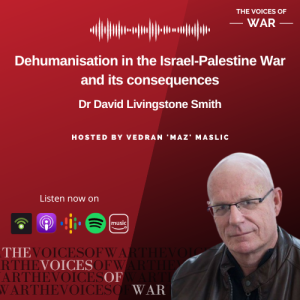
Thursday Feb 27, 2025
Thursday Feb 27, 2025
Today, I spoke with Dr David Livingstone Smith, who is a philosophy professor at the University of New England. He specialises in the study of dehumanisation and mass violence. David is the author of several award-winning books, including ‘Less Than Human: Why We Demean, Enslave and Exterminate Others’ as well as ‘On Inhumanity: Dehumanization and How to Resist It’. David’s most recent book that is: 'Making Monsters, The Uncanny Power of Dehumanisation'. David joined me to provide his expert opinion on dehumanisation we are witnessing as part of the ongoing war between Israel and Hamas.
Key Topics Covered:
Dehumanisation and Its Roots: David delves into the psychological and social aspects of dehumanisation, explaining how it serves as a precursor to violence.
Israel-Hamas Conflict: A focus on the risks and implications of dehumanisation in the ongoing war between Israel and Hamas.
The Role of Fear: David discusses how politicians, particularly authoritarian ones, capitalise on fear to manipulate behaviour.
Social Dynamics: The conversation touches on how social forces and community behaviour can either inhibit or encourage violence.
The Power of Public Opinion: David emphasises the need for influential voices to steer public opinion towards constructive solutions.
Resources:
You can find my previous discussion with David here.
David’s Substack, which includes all the essays he mentioned is available here.
Less Than Human: Why We Demean, Enslave and Exterminate Others
On Inhumanity: Dehumanization and How to Resist It
Finally, don't forget to subscribe, rate, and share The Voices of War to help us continue exploring the complex narratives of war. To comment or take the conversation further, please connect to us here:
https://www.thevoicesofwar.com
https://www.twitter.com/twitter.com/thevoicesofwar
https://au.linkedin.com/company/the-voices-of-war
https://www.youtube.com/youtube.com/thevoicesofwar
#Dehumanisation #IsraelHamasConflict #SocialDynamics #TheVoicesOfWar #DavidLivingstonSmith #IsraelPalestineWar #IsraelHamasWar #Israel #Palestine #Hamas
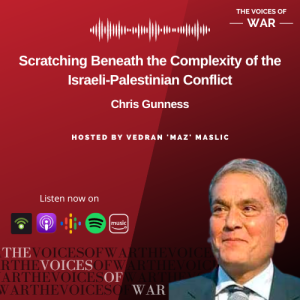
Thursday Feb 27, 2025
Thursday Feb 27, 2025
My guest today is Chris Gunness who is a seasoned journalist and diplomat with decades of experience reporting on and working in the Middle East. Chris began his career at the BBC in 1982, and for 23 years, he served in numerous capacities including reporter and foreign correspondent. In 2005, he transitioned to diplomacy, joining the United Nations Special Coordinator for the Middle East Peace Process, and later became the Spokesman for the United Nations Relief and Works Agency for Palestine Refugees (UNWRA). Post-UN, Chris founded the Myanmar Accountability Project in 2021, which brings criminal prosecutions against members of the Myanmar Junta and he is currently the Director of this initiative.
Chris joined me for his reflections on the tragic escalation of violence in Israel and across Gaza and the West Bank.
Some of the topics we covered include:
Underlying Causes of Conflict: Chris delved into the root causes of the Israeli-Palestinian conflict, highlighting the blockade of Gaza, the ongoing Israeli occupation and unfettered settlement expansion.
The Blockade of Gaza: Chris discussed Israel's control over Gaza's land, sea, and air borders, emphasising the humanitarian crisis this has caused.
Dehumanisation: Chris talks about the ‘Red Lines’ policy and how it reflects the dehumanisation of Palestinians.
Role of the International Community: Critical reflection on the international community's role in perpetuating the conflict, particularly the U.S.'s unwavering support for Israel.
Need for a Mandela Figure: Chris suggested that the conflict needs a leader with a vision of peace and the courage to see it through.
Israeli Cabinet's Rhetoric: He points out the dehumanising language used by some Israeli cabinet ministers, such as ‘Gaza needs to be put on a diet’
Resources:
Professor Rashid Khalidi - Understanding the Israeli-Palestinian Conflict: An Exploration of Root Causes and Geopolitical Dynamics
Finally, don't forget to subscribe, rate, and share The Voices of War to help us continue exploring the complex narratives of war. To comment or take the conversation further, please connect to us here:
https://www.thevoicesofwar.com
https://www.twitter.com/twitter.com/thevoicesofwar
https://au.linkedin.com/company/the-voices-of-war
https://www.youtube.com/youtube.com/thevoicesofwar
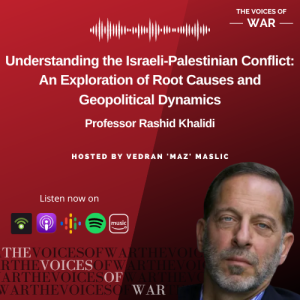
Thursday Feb 27, 2025
Thursday Feb 27, 2025
In today's episode, I am honoured to host Professor Rashid Khalidi, a distinguished scholar and the Edward Said Professor of Modern Arab Studies at Columbia University. Known for his profound insights into Middle Eastern politics, Professor Khalidi is also the author of the ground-breaking book ‘100 Years' War on Palestine: A History of Settler Colonialism and Resistance, 1917–2017’. He joined me to discuss the intricate dynamics of the Israeli-Palestinian conflict, the geopolitics of the Middle East, and the role of international actors in shaping the region. Given the ongoing escalation of violence in Israel and across the Occupied Territories, the importance of nuance cannot be understated.
Some of the topics we covered include:
Historical Roots of Zionism: Understand the pivotal roles played by Britain and the United States in the creation of Israel and support of Zionism.
Israeli Settlement Expansion: Explore the controversial policies surrounding Israeli settlement expansion and their impact on the region.
Life Under Occupation: Gain insights into the daily struggles faced by Palestinians living under Israeli occupation.
Western Hypocrisy in International Politics: Examine the dichotomy between interests and values, and how Western nations often display hypocrisy in their international political stances.
Religious Influence in Israeli Politics: Delve into the role of religious ideologies in shaping Israeli political policies.
De Facto Annexation of Palestinian Territories: Learn about the unofficial yet impactful annexation of Palestinian lands by Israel.
Challenges in Palestinian Diplomacy: Understand the hurdles faced by Palestinian leadership in their diplomatic efforts.
Global Geopolitics and the Israeli-Palestinian Conflict: Explore how the conflict fits into broader geopolitical trends and alliances.
The 'Shared Values' Argument Between the U.S. and Israel: Examine the evolving narrative of 'shared values' and its implications for U.S.-Israel relations.
Potential for Change in Israeli-Palestinian Relations: Discuss the possibilities for meaningful change in the conflict, particularly in the context of shifting global public opinion.
Don't miss this enlightening episode that offers a comprehensive and nuanced understanding of the Israeli-Palestinian conflict, Middle Eastern geopolitics, and the role of international actors.
Resources:
Professor Rashid Khalidi’s book: The Hundred Years' War on Palestine: A History of Settler Colonialism and Resistance, 1917-2017
Finally, don't forget to subscribe, rate, and share The Voices of War to help us continue exploring the complex narratives of war. To comment or take the conversation further, please connect to us here:
https://www.thevoicesofwar.com
https://www.twitter.com/twitter.com/thevoicesofwar
https://au.linkedin.com/company/the-voices-of-war
https://www.youtube.com/youtube.com/thevoicesofwar

Thursday Feb 27, 2025
Thursday Feb 27, 2025
Today, I welcome back Carl Miller, a leading expert in the ethics of artificial intelligence and the Research Director at Demos, a UK-based think tank. After his insightful discussion on information warfare, cyber-attacks, and weaponisation of social media in Episode 51, Carl returns to delve deeper into the ethical, social, and political ramifications of AI. From exploring the centralisation of power in AI development to discussing real-world case studies on deepfake technology and ethical risks, this episode offers a comprehensive look at the complex landscape of AI governance and ethics. Carl also shares inspiring stories of AI's potential for social good, making this a must-listen for anyone interested in the future of AI and its impact on society.
As you’ll hear, Carl also shared details about his latest project Recursive Public, an experiment in identifying areas of consensus and disagreement among the international AI community, policymakers, and the public on key questions of governance. Please consider supporting this important and worthwhile AI governance project. You can register here.
Some of the other topics we covered are:
A Think Tanker's Foray into AI Ethics
Carl’s background in public policy and his role at Demos, a leading UK think tank with a focus on AI ethics and governance.
Understanding Power Dynamics in the AI Era
Carl defines the concept of power in the digital age and its implications for AI governance.
Categorising different forms of power, including economic and coercive power, and how they relate to AI development.
Who Holds the Reins of AI? The Centralisation of Power
An in-depth look into the entities that hold the levers of power in AI, from tech giants to governmental bodies.
Centralisation of AI Technologies
Discussion on the centralisation of AI technologies like GPT and its societal implications.
Fostering a Collaborative Community in AI
Carl emphasises the need for a less hostile, more collaborative approach to AI ethics and governance.
Ethical Concerns: AI's Potential for Social Harm
Exploration of the ethical risks associated with AI, particularly in polarised societies and areas lacking human rights frameworks.
The Agency of AI: A Risk Assessment
Discussion on the conditions under which AI could become a dangerous entity, including the potential for autonomous action.
Deepfakes and Misinformation: A Case Study
A real-world example of how deepfake technology was utilised to create misleading news broadcasts in Venezuela.
Positive AI Use Cases: Empowering the Marginalised
Inspiring stories from India where AI is bridging the digital divide and improving access to government services.
Future of AI Ethics
The episode concludes with a look at what's next in the field of AI ethics and governance.
Resources:
Carl Miller's Book: The Death of the Gods
Intelligence Squared Podcast
Episode 51 with Carl Miller
Finally, don't forget to subscribe, rate, and share The Voices of War to help us continue exploring the complex narratives of war. To comment or take the conversation further, please connect to us here:
https://www.thevoicesofwar.com
https://www.twitter.com/twitter.com/thevoicesofwar
https://au.linkedin.com/company/the-voices-of-war
https://www.youtube.com/youtube.com/thevoicesofwar
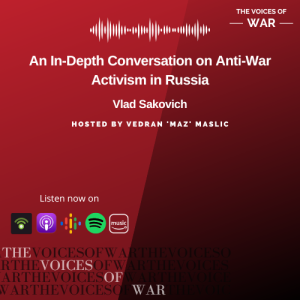
Thursday Feb 27, 2025
Thursday Feb 27, 2025
In this compelling episode, we explore the challenges and realities of anti-war activism in Russia with Moscow-based educator and activist, Vlad Sakovich. From the risks of questioning the regime to the complexities of fostering dialogue, Vlad provides a nuanced look into the intricacies of activism in a restrictive environment.
Brief Summary of Vlad Sakovich:
Vlad Sakovich is a Moscow-based educator, psychologist, and anti-war activist. Despite the risks associated with his work, Vlad has been deeply involved in grassroots dialogue initiatives and anti-war movements since the 2014 Donbas War and Crimea's annexation. He facilitates open forums for Russians to discuss the war and runs an online course on civic facilitation, aiming to change the Russian narrative surrounding the conflict.
Key points covered in the conversation:
Introduction to Vlad Sakovich
Background as an educator, psychologist, and anti-war activist
Initiatives like open forums and online courses on civic facilitation
Motivations for Activism
Gradual involvement sparked by a series of incidents
Initial focus on societal change while being apolitical
Turning Point in Activism
Connection and subsequent disconnect with a Ukrainian mediator at an international conference
Realisation of the need for dialogue in conflict situations
Challenges and Realities in Russia
The diverse profiles of those supporting the invasion
The risks associated with questioning the Russian regime
The difficulties of fostering dialogue in a restrictive environment
The sparse network of anti-war activists in Russia
The impact of legislation criminalising dissent
The emotional toll of activism in a high-risk setting
Work and Objectives
The compelling need to take action
Various trials and efforts in fostering dialogue
The importance of grassroots initiatives in a country where top-down change is unlikely
This episode offers a rare glimpse into the challenges of anti-war activism in Russia, a topic often shrouded in complexity and risk. While this episode remains free to all, please consider subscribing to The Voices Of War here, to gain access to all other episodes. I thank you for supporting the show.
Lastly, to find out more about the excellent initiative by my friends over at IN2 Comms I mentioned in the intro, please go here.
Thank you for listening. To comment or take the conversation further, please connect to us here:
https://www.thevoicesofwar.com
https://www.twitter.com/twitter.com/thevoicesofwar
https://au.linkedin.com/company/the-voices-of-war
https://www.facebook.com/facebook.com/thevoicesofwar
https://www.youtube.com/youtube.com/thevoicesofwar
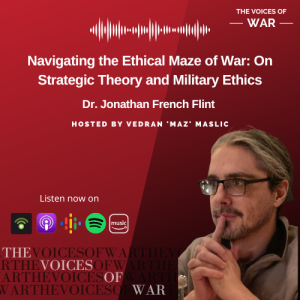
Thursday Feb 27, 2025
Thursday Feb 27, 2025
In today's episode, I sit down with Dr. Jonathan French Flint, an Inamori Research Associate at Case Western Reserve University with a focus on military ethics and strategic theory.
Dr. Flint has a background in teaching in the UK and has presented his work at a range of academic venues, including the United States Army Command and General Staff College. He has also made contributions to military ethics literature, notably with the International Committee of the Red Cross, and has appeared on the Canadian CTV Network as an expert discussing the war in Ukraine and broader issues in military and international affairs.
Our conversation aims to explore the complexities of Strategic Theory, particularly its role in informing decisions about war. Dr. Flint brings a unique perspective to this subject, advocating for the inclusion of ethical considerations in strategic planning for conflict.
Here are some of the key topics we cover:
**Pathway to Specialisation**: Dr. Flint shares how he entered the niche field of military ethics and Strategic Theory.
**Unlocking Strategic Theory**: We examine what Strategic Theory entails and the problems it seeks to solve.
**Defining 'Victory'**: We discuss the often-ambiguous term 'Victory' in the context of warfare.
**'Wars of Choice' Conundrum**: Dr. Flint elaborates on the difficulties tied to defining victory in wars of choice.
**Ethics vs. Interests**: A look into the tension between moral values and geopolitical interests in 'wars of choice'.
**Moral Injury**: An exploration of the concept of 'moral injury' as it relates to ‘wars of choice’.
**Ethical Frameworks**: We discuss General McChrystal's concepts of 'Courageous Restraint' and 'Insurgent Math'.
**Moral Compass**: The conversation turns to defining the difference between morals, morality, and ethics in warfare.
**Case Studies**: Dr. Flint briefly outlines his thesis, examining the Falklands and Kosovo conflicts through an ethical lens.
**Accountability**: We close with a discussion on the responsibility of senior political and military figures for unethical actions on the battlefield.
This episode provides a nuanced exploration of the ethical considerations in Strategic Theory and warfare. It's a thought-provoking listen for those interested in going beyond surface-level discussions about conflict.
**Join the Conversation**
For listeners looking to engage with this discussion further, follow us and comment:
https://www.thevoicesofwar.com
https://www.twitter.com/twitter.com/thevoicesofwar
https://au.linkedin.com/company/the-voices-of-war
https://www.facebook.com/facebook.com/thevoicesofwar
https://www.youtube.com/youtube.com/thevoicesofwar
**Thank You for Listening!**
We invite you to share, comment, and subscribe. If you enjoyed this episode, please leave a review on Apple Podcasts https://podcasts.apple.com/au/podcast/the-voices-of-war/id1551498657 or your preferred podcast platform.
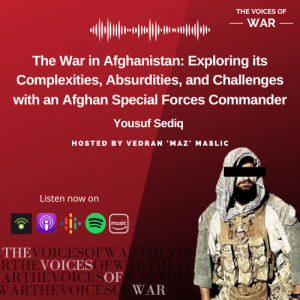
Thursday Feb 27, 2025
Thursday Feb 27, 2025
Today's episode is a compelling and insightful conversation with Yousuf Sediq, a former Afghan Special Forces Operator and the author of '5000 Days of War: The Firsthand Account of an Afghan Special Forces Operator.'
Yousuf's book is an honest and vivid portrayal of his experiences in the Afghan war, offering unparalleled insight through the eyes of a native Afghan who grew up under Taliban rule. Following the fall of the Taliban in 2001, Yousuf's journey took him from an interpreter for the Coalition Forces to becoming a squadron commander in the ultra-secret Task Force-241. He also played a key role in the security of the Kabul International Airport during the chaotic withdrawal in August 2021.
In This Episode, You'll hear about:
Life Under the Taliban: Growing up under the oppressive rule of the Taliban in Afghanistan.
Joining the Battle: The personal journey of Yousuf Sediq in joining with the Coalition Forces in the fight against the Taliban.
Interpreter on the Frontline: Yousuf's initial experiences and the vital role of interpreters in the Afghan war.
The Plight of Coalition Interpreters: A detailed discussion on the challenges and misunderstood lives of interpreters.
Private Company Treatment of Interpreters: An exploration of employment conditions for interpreters in Afghanistan.
Understanding Afghan Local Context: The significance of cultural and local insight in military operations.
Surviving Explosions and Brain Injury: The effects and recovery from severe war injuries.
The Rise to Task Force 241: Yousuf's entry and progression through the Afghan Commandos to Task Force 241.
Inside Task Force 241: An in-depth look at the secret unit, its missions, impact, and capabilities in Afghanistan.
Legal Prosecution of Taliban Fighters: The legal complexities and challenges surrounding the prosecution of the Taliban.
Engagement Rules within Task Force 241: An examination of ethical guidelines and conduct within the secretive unit.
CIA-Funded Units & War Crime Allegations: A critical discussion on controversial actions and allegations within Afghanistan.
Trust in the Shadows of Task Force 241: Why trust plays a crucial role within military units.
Defending Kabul with Task Force 241: The vital role of Task Force 241 during the fall of Kabul in 2021.
Afghan Civilians & Security Forces: Insights into how Afghan civilians perceive their security forces.
Post-Taliban Takeover Allegiances: The shifting political and tribal alliances following the resurgence of the Taliban.
Afghanistan's Uncertain Future: Reflections and predictions on the prospects for Afghanistan.
For listeners looking to engage with this discussion further, follow us and comment:
https://www.thevoicesofwar.com
https://www.twitter.com/twitter.com/thevoicesofwar
https://au.linkedin.com/company/the-voices-of-war
https://www.facebook.com/facebook.com/thevoicesofwar
https://www.youtube.com/youtube.com/thevoicesofwar
**Thank You for Listening!**
We invite you to share, comment, and subscribe. If you enjoyed this episode, please leave a review on Apple Podcasts https://podcasts.apple.com/au/podcast/the-voices-of-war/id1551498657 or your preferred podcast platform.
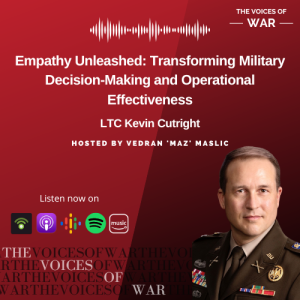
Thursday Feb 27, 2025
Thursday Feb 27, 2025
In today's episode, my guest is Lieutenant Colonel Kevin Cutright, a prominent Associate Professor in the Department of English and Philosophy at the US Military Academy, West Point. Kevin's extensive in-the-field experiences have fuelled his exploration into the ethical aspects of military planning and conduct, the role of empathy, and the concept of moral injury.
We delve deep into the significance of empathy in military operations, a subject comprehensively covered in Kevin's newly published book, 'The Empathetic Soldier.' Not only relevant but his insights on empathy are also crucial for military personnel and those responsible for making war decisions.
During our conversation, we shed light on several pivotal points:
- Kevin's military background and experiences.
- Benefits of the US Military's academic approach.
- Origins of Kevin's interest in empathy.
- Defining empathy: challenges and nuances.
- Differentiating between etic and emic perceptions of the world.
- Role and value of empathy in operational contexts.
- Security Force Assistance Brigades: their purpose and capabilities.
- Mitigating the potential risks of operational empathy.
- Intersection of empathy with the principles of 'Just Cause' and 'Right Intention' in warfare.
- Exploring 'Moral Injury': its definition and its ties with empathy.
- Methods and significance of empathy training.
- Using empathy as an instrument for understanding adversaries, mitigating bias, and enhancing decision-making.
- Discussing the critical role of 'strategic empathy.'
Join us in this engaging dialogue as we unpack these topics, offering a fresh perspective on empathy's role within the military realm.
Thank you for listening. To comment or take the conversation further, please connect to us here:
https://www.thevoicesofwar.com
https://www.twitter.com/TheVoicesOfWar
https://www.linkedin.com/company/the-voices-of-war
https://www.facebook.com/thevoicesofwar
https://www.youtube.com/thevoicesofwar
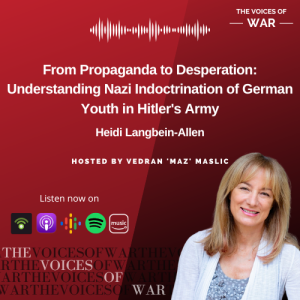
Thursday Feb 27, 2025
Thursday Feb 27, 2025
My guest today is Heidi Langbein-Allen who recently published the memoirs of her father, Willi Langbein, who at the age of 13 was forced to fight for the Nazis.
The book is called ‘Save the Last Bullet: Memoir of a boy soldier in Hitler’s Army’ and it vividly explores the use of propaganda and misinformation to give moral weight to an otherwise losing and abhorrent cause. It is also a story of lost innocence and despair in the face of circumstances beyond the control of fully grown adults, let alone children and teenagers. But it is also a story of determination, resilience, and hope, nurtured in the ruins of post-war Germany.
Some of the topics we covered are:
Nazi propaganda's deliberate targeting of children and youth
Indoctrination techniques used in organisations like the Jung Volk and Hitler Jugend
Structural changes made to history and national narrative to align with Nazi ideology
Willi Langbein's personal motivation to share his story and experiences
The brutal enforcement of collective punishment and forced submission to authority by the SS
The significance behind Willi's first battle and the concept of ‘saving the last bullet’
Willi's experiences during the physical end of the war and his treatment as a person under confinement
How German soldiers and citizens perceived German atrocities during the war
Germany's handling of collective guilt in the aftermath of World War II
Transforming despair into hope in the face of post-war challenges
Heidi's upbringing with an emotionally unavailable father and its impact on her life
The positive reception of the book and its ability to resonate with young readers
The reasons behind positive reviews from the Jewish community regarding the book
Heidi's ongoing projects and plans for the future
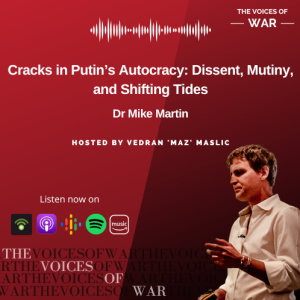
Thursday Feb 27, 2025
Thursday Feb 27, 2025
Today, I spoke with Dr Mike Martin who is one of the go-to voices for insights and analysis of the war in Ukraine.
Mike has authored several books, amongst which is still one of my favourites on conflict titled ‘Why We Fight’. Mike also recently released a new book titled, ‘How to Fight a War’, that details why wars are won and why they are lost. The book is getting released in Australia on the 1st of July and can be ordered here.
Mike joins me today for an update on the war in Ukraine, especially on the events that transpired in Russia over the past week. Some of the themes we discussed are:
Reasons for brittleness of autocratic regimes
Sawing of dissent within Russian ranks
The potential impact of the mutiny on the battlefield in Ukraine
Discussion on the seeming purge of Prigozhin’s allies
The possible shift of position by China
Potential future scenarios
Recent previous episodes with Dr Mike Martin:
https://thevoicesofwar.com/68-special-release-dr-mike-martin-and-john-spencer-an-update-on-ukraine/
https://thevoicesofwar.com/58-dr-mike-martin-and-ltgen-ret-arne-dalhaug-update-on-the-russian-invasion-of-ukraine/
https://thevoicesofwar.com/20-dr-mike-martin-update-on-unfolding-situation-in-afghanistan/
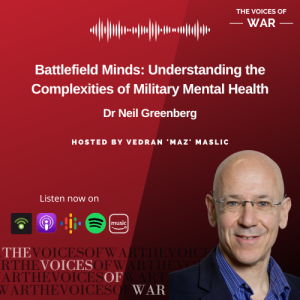
Thursday Feb 27, 2025
Thursday Feb 27, 2025
Today, I had the pleasure of speaking with Dr. Neil Greenberg, an esteemed clinical and academic psychiatrist based at King's College London. With a remarkable 23 years of experience in the United Kingdom Armed Forces, Neil has provided psychiatric care and conducted extensive research in challenging environments, including Afghanistan and Iraq.
In addition to his invaluable practical experience, Neil has made significant contributions to the field of psychiatry, with over 120 published scientific papers and book chapters. He is widely recognised as an expert speaker on topics such as psychological well-being in the UK Armed Forces, traumatic stress management, and occupational mental health. Notably, Neil was also involved in the appeal trial of Royal Marine Sergeant Alexander Blackman, a high-profile case concerning the killing of an injured Afghan insurgent.
During our conversation, Neil shared valuable insights on the crucial issue of mental health within military and veteran communities. Here are some of the key topics we discussed:
· Neil's background in the UK Armed Forces and qualification as a Green Beret
· Most common mental health issues faced by military personnel
· Distinguishing between PTSD, Adjustment Disorder, and Depression
· Risk factors of mental health challenges in the military
· How to reduce the risk of mental health injuries
· Understanding Moral Injury and its three primary causes
· The inoculating effect of a meaningful narrative
· What makes otherwise morally sound people do unethical deeds
· The role of leadership in maintaining mental health
· Individual moral degradation vs group moral degradation
· Distinguishing between a psychologically good and psychologically bad war
· Blurring of the morality line by operational ineffectiveness
· The case of Royal Marine, Sergeant Blackman, associated war crimes trial, and appeal
· Finding solutions in combat that may clash with our moral compass and society's expectations
· The unique nature of Sergeant Blackman's case and its role as a precedent to account for the impact of war on soldiers' mental health
· The importance of considering how mental health challenges impact families and the broader community
#TheVoicesOfWar #mentalhealth #military #veterans #psychiatrist #research #traumaticstress #PTSD #occupationalhealth #peerledsupport #TRiM #UKArmedForces #King'sCollegeLondon #deployment #hostileenvironments #traumamanagement #organisationalhealth #psychologicalwellbeing #combatstress #veterancommunity #mentalhealthawareness #warcrimes #moraldrift
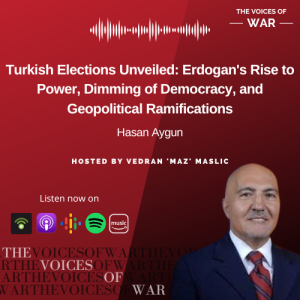
Thursday Feb 27, 2025
Thursday Feb 27, 2025
My guest today is Hasan Aygun, who is a prominent Turkish security analyst with an extensive career in international relations, global security issues and conflict management both as a diplomat and later as a political adviser.
Some of our long-time listeners might recognise Hasan’s biography, as he appeared on the show all the way back in June of 2021. To hear more about Hasan’s extensive background and experiences, listen here.
Today, however, Hasan joins me to discuss the results of the recent Turkish elections and possible implications for the country, the region, and the rest of the world.
Some of the topics we discussed are:
Hasan’s observations of the electoral process in Turkey
The historical context to Turkish politics and Erdogan’s rise to power
Description of the three dominant social groups determining election results
Gradual decline into authoritarianism and its effects on the ‘fairness’ of Turkish elections
Analysing the arrest of Istanbul’s mayor and credible rival to Erdogan, Ekrem Imamoglu
Exploring the factors behind Turkey’s rapid economic decline
Ownership of television and print media in Turkey and its impact on public discourse
Suppression of dissenting voices and threats to journalists in Turkey
The exploitation of migrants and Syrian refugees for political gain in Turkey
The influence of the February earthquake on voter sentiment in Turkey
The diminishing state of democracy in Turkey and its consequences
Evaluating the geopolitical winners and losers following Erdogan’s victory
Examining Turkey’s relationship with NATO and its implications
The ‘F-35 Affair’ and its effects on Turkey-US relations
Turkey’s ties with Russia and the consequences of Finland joining and Sweden’s imminent entry into NATO
Exploring rumours surrounding Erdogan’s health issues




